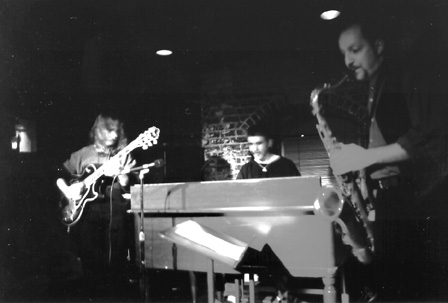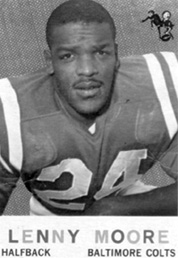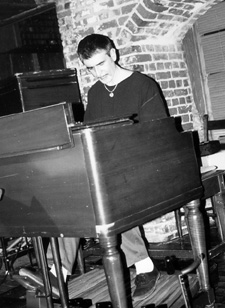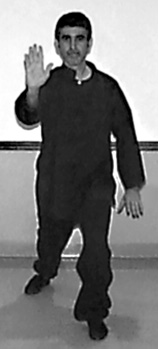 with his organ. With his left hand he lays down the bass line, and with
his right he leads the four members of his band, The Greg Hatza Organization,
into a swinging, upbeat jazz number that lights up the darkened venue with
electricity.
with his organ. With his left hand he lays down the bass line, and with
his right he leads the four members of his band, The Greg Hatza Organization,
into a swinging, upbeat jazz number that lights up the darkened venue with
electricity.NBT Profile: Greg Hatza
From music to martial arts, this Marylander has all the right moves.
by Nathaniel Knoll
photos by Betsy Kehne
At the King Of France Tavern in Annapolis, Greg
Hatza's hands and feet are a study in coordination as they become one  with his organ. With his left hand he lays down the bass line, and with
his right he leads the four members of his band, The Greg Hatza Organization,
into a swinging, upbeat jazz number that lights up the darkened venue with
electricity.
with his organ. With his left hand he lays down the bass line, and with
his right he leads the four members of his band, The Greg Hatza Organization,
into a swinging, upbeat jazz number that lights up the darkened venue with
electricity.
Hatza's hands are a blur as his feet pump the pedals of his Hammond B-3 organ with stunning precision. How can his brain direct hands and feet to separate tasks?
"One side of the brain is doing one thing while the other is doing another," Hatza says. "If I think about it too much, I don't think I would be able to do it."
This is clearly no amateur performance. Hatza, 50, who lives in the northeast Hamilton area of Baltimore, is one of the finest jazz organists in the country; one of his CDs, The Greg Hatza Organization: In My Pocket, went to No. 9 on the jazz charts; another, Snake Eyes, will be released in June.
Amazingly, jazz is not all that Hatza's hands and feet do well.
Come Wednesday evening, at the Cape St. Claire Clubhouse, Hatza has traded his musical attire for a black gi and his hot jazz for soothing Oriental music. In the front of a spacious room, he leads a class in Tai Chi, teaching his students the art of gravity and balance.
Music and movement are important in many people's lives. But seldom do they join forces with such power and success as they have with Greg Hatza. They are central not only to his life but to his livelihood, as he is one of the select few who has been able to carve a career out of both.
And like his feet and hands in jazz, it's all happening at the same time.
A Boost from Colts' Lenny Moore
How a small-town white teen became buddies with Baltimore Colts' football great Lenny Moore is one of the amazing parts of Greg Hatza's life story.
 Growing up in Redding, Penn., Hatza was a
natural on the piano. He moved way beyond Chopsticks at a tender age, and
at five, he was duplicating the keyboards from the jazz records played by
his parents.
Growing up in Redding, Penn., Hatza was a
natural on the piano. He moved way beyond Chopsticks at a tender age, and
at five, he was duplicating the keyboards from the jazz records played by
his parents.
Ray Charles, one of few African American musicians to have entered the mainstream of American music in the 1960s, was an influence. Also making music that appealed to Hatza were jazz pianist Oscar Peterson and jazz organist Johnny Hammond Smith. Hatza made the transition from piano to organ and began playing with dedication.
Before long, he was sitting in at jazz clubs throughout Pennsylvania. One fateful night, someone special was in the audience watching15-year-old Hatza on organ.
He was Lenny Moore, the fleet running back of some of the most fearsome Colts squads. And, it so happens, a Redding native himself. If there was one thing that the Colts' No. 24 knew besides football, it was jazz. And what he heard from Hatza, he loved.
It just so happened that Moore, who was opening his own jazz club in Baltimore, invited Hatza to check it out.
A few months later, at the ripe old age of 16, Hatza decided to take Moore up on his offer. With his mother, Hatza journeyed to Baltimore to Moore's club, The Sportsman's Lounge, and that night he sat in for an evening session. Once more, Lenny More liked what he saw.
"I'd like to be your manager," Moore said.
Talent Honed
The idea of Lenny Moore offering to manage your career is akin to Cal
Ripken calling to say he wants to take your son under his wing. The kid
must be real good.
While Hatza's fellow students were playing in the high school band or joining the Drama Club, he was making regular three-hour commutes to Baltimore. And he wasn't hitchhiking once he got to Maryland; the great Lenny Moore was picking him up at the bus station.
Baltimore, of course, was a thriving environment for jazz back then, and Hatza plunged in. At The Sportsman's Lounge, the white kid from Redding jammed with such jazz legends as Jimmy Smith, Groove Holmes and Jimmy McGriff. At the age of 18, he released his first album.
Hatza was about to graduate from high school, and he needed to start thinking about the rest of his life. So he applied at the prestigious Peabody Conservatory of the Johns Hopkins University in Baltimore and was accepted. Known worldwide for its music department, Peabody is especially famous as a training ground for organists.
As Hatza became a full-fledged Marylander, Lenny Moore's place in his life grew larger. Not only did Moore give him a place to stay, he also took him to all the Colts' home games.
"It was an interesting period for me," says Hatza.
To say the least.
Meeting Martial Arts
With a bachelors degree from the Peabody Conservatory and a masters from Towson State University, Hatza learned plenty about music composition, improvisation and theory. From Lenny Moore and The Sportsman's Lounge, he also had gleaned a great deal about life.
As his music soared, Hatza felt he needed something physical in life. Not the size of a Lenny Moore, he liked the idea of a smaller person being just as physically powerful. At age 21, he took his first karate lesson and before long, he had acquired another lifelong pursuit.
At that time in Baltimore there were no kung-fu schools but there was Tokyo Carate-Do, a local karate school. He studied the Japanese Shoto Khan form of karate and after five years received his black belt.
 It was the era of kung-fu movies,
and Hatza admits that Bruce Lee had an impact on him. Before long, he was
studying Chinese martial arts - Wing Chung, Snow Tiger and Pa Kua Chang.
But one form had a special allure: Tai Chi.
It was the era of kung-fu movies,
and Hatza admits that Bruce Lee had an impact on him. Before long, he was
studying Chinese martial arts - Wing Chung, Snow Tiger and Pa Kua Chang.
But one form had a special allure: Tai Chi.
Hatza became a disciple of veteran instructor, Sifu Park Bok Nam, immersing himself in what is known as the internal school of martial arts. Internal, Hatza says, because "physical focus and mental awareness are vital components."
In this country tai chi is generally thought of as a health exercise or "some sort of dance," as Hatza put it. Actually, it is a martial art form of 103 fighting applications slowed down into meditative movements. Although tai chi is a therapeutic activity, it can also be used to develop physical strength, balance, coordination, concentration and focus.
Power of Tai Chi
"It's important to loosen your body and muscles with warm-up exercises," Hatza tells me and other students in his class at the Cape St. Claire clubhouse. As we practice what are called bent-over spine rolls, by rolling the spine left and right with our legs shoulder-width apart, the muscles start to relax.
After a series of stretches and the traditional bow with fist in palm comes our lesson for the evening.
"Your weight is shifted from right leg to left leg using gravity rather than muscular strength," says our instructor. We gradually move into motions that, when done with proper grace, truly resemble the poetic names they have been given, among them: "wave hands like clouds" or "white crane spreads wings."
The movement we are learning on this night is called "brush knee - strike with palm," a blocking and striking technique applied with relaxed grace.
Tai chi has its roots in ancient Daoist philosophy. It is said that Daoist legendary figure Zhang San-Feng, born this week seven centuries ago, realized the art when he witnessed a fight between a magpie - some say it was a crane - and a snake.
The snake's evasive, soft circular movements against the bird's attack gave San-Feng the idea that softness can overcome firmness.
Tai chi deals with marshalling life force energy or what in Chinese medicine is called chi (pronounced chee.)
"Everyone has chi energy, which is passed on from our parents, and we are born with," explains Hatza. "Chi energy is based in the gut of the stomach and has an energy level like that of a battery, which can, if not maintained, diminish and eventually die."
Our chi energy flow can be disrupted because of our lifestyles or any number of reasons. Tai chi can recharge this energy and balance our yin and yang - light energy and heavy energy. The proper balance can strengthen the immune system, nourish the internal organs, as well as promote overall good health.
Under Hatza's guidance, I can feel the chi energy flowing from the gut throughout my body and into my fingertips, bringing the sensation of heat. I am a first-time student, but at the end of the night, I leave feeling calm and at one with my body.
"Greg is an excellent teacher, very caring and considerate, very methodical and committed to helping each student at his or her level," said student Deborah Banker of Annapolis.
"Tai chi is a great exercise for me because it relaxes and energizes, while at the same time helping with back trouble that I have," said Banker. "What sets Greg apart is that he pulls in the self-defense aspect, which when added makes tai chi much more powerful."
'Dual Life'
Like his music, Hatza's martial arts have become a lifetime endeavor. "The more you study, the more you discover about the inner workings of your body and the forces within," he said.
To broaden and refine his knowledge of tai chi, Hatza periodically attends seminars of Yang Zhen Duo, which are held throughout the country, with a summer seminar to be held in Winchester, Va. The form of tai chi taught by Hatza is in the tradition taught by master Yang Zhen Duo, who is the fourth generation of the Yang family to refine this art.
Along with tai chi, Hatza also teaches the Pa Kua Chang system of Sifu Park Bok Nam, who, with over 34 years of experience is one of the most highly skilled Pa Kua Chang teachers alive. It is similar to tai chi, with movements that are quicker, and combines breathing exercises, weapons knowledge and meditation with fighting principles.
"What tai gives to me is a means of dealing with life. It gives me strength when things are difficult, spiritual focus, help to avoid being caught up in life's daily tribulations, and mental as well as emotional control," Hatza says.
Hatza divides his time each day between his two loves, martial arts and music and finds they complement each other.
Nor does the combination seem odd to Hatza's alma mater, Peabody Conservatory - a 140-year-old music college that has trained more church than jazz organists.
"It's extraordinary what our graduates end up doing, they can build a career around themselves better than any other group I know," said Anne Garside, spokesperson at Peabody Conservatory. "Inventive and versatile, they can create their jobs."
An experienced entertainer, Hatza performs live as often as he can. Most recently he returned to his Pennsylvania roots, where he played at the Berks County jazz festival in his home town of Redding. Locally, the Greg Hatza Organization can be seen by New Bay Times readers in the Annapolis area at The King of France Tavern.
"I heard about Greg through his manager and booking agent, Michael Cherigo. They received a fairly good crowd the evenings they played, and we hope to have them return," said Mary Fedorchak, who books the top-rate jazz acts at the historic Annapolis inn and long-time jazz venue.
A bit farther afield, Hatza plays at The New Haven Lounge in Baltimore.
Keith Covington, booking agent at The New Haven Lounge was so impressed with Hatza's use of a synthesizer to imitate the hard-to-transport B-3 organ that he offered to bring in the real thing for an evening set. The night went well, and Hatza is now considered the "standard for jazz organists who play at the lounge. We try to get him in at least every four to six weeks."
While he enjoys live music gigs, Hatza devotes himself to writing music and recording. You'll hear his original compositions, "Juicy," "Bossa Nowhere", "The Wizard," "Midnight Freight," "From Me to You" and "Tournament" - as well as such standards as Hoagy Carmichael's "Georgia on My Mind," included on his first CD release The Greg Hatza Organization. His third effort Snake Eyes, (New York: Palmetto Records) will be in record stores before summer. Featured musicians on Snake Eyes are: Dennis Chambers, drums; Ralph Lalama, tenor sax; and Paul Bollenback, guitar.
What connects Hatza's tai chi days and jazz nights?
"Tai Chi helps to focus, since the organ itself takes a great deal of concentration," Hatza says. "I become two people at the same time, since I have to play bass as well as lead.
"I lead a dual life. Music and martial arts complement one another."
Interested in tai chi or pau kua chang? Call 410/325-5130 or 410/721-0652.
| Back to Archives |
VolumeVI Number 14
April 9-15, 1998
New Bay Times
| Homepage |